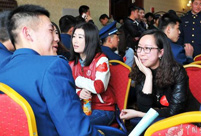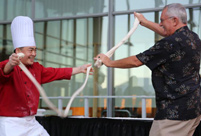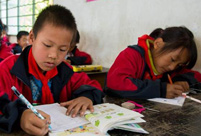 'Model husband' shatters image of love
'Model husband' shatters image of love
 Can animals smile? Or put on a happy face
Can animals smile? Or put on a happy face
 Geng Xuan crowned at 9th China Super Model Contest
Geng Xuan crowned at 9th China Super Model Contest
 Top 10 billionaires in the liquor industry
Top 10 billionaires in the liquor industry
 Backstage at China Fashion Week
Backstage at China Fashion Week
 Ballerinas anywhere but onstage
Ballerinas anywhere but onstage
 Top 10 safest airlines in the world
Top 10 safest airlines in the world
 Posters of 33rd HK Film Awards unveiled
Posters of 33rd HK Film Awards unveiled
 Top 10 most popular instant messaging apps in the world
Top 10 most popular instant messaging apps in the world
 Inspiring shadow images of Chinese army
Inspiring shadow images of Chinese army
According to a Pew poll last November, 52 percent of Americans believed the US "should mind its own business internationally". Some argue that the US is making strategic adjustments to its diplomacy, as manifested in the way it has dealt with issues of Syria, Afghanistan and Ukraine. In this article, experts from China and abroad offer their opinions regarding such perceived adjustments and the direction of future US foreign policy.
Joseph Nye, political scientist at Harvard University, former US Assistance Secretary of Defense.
Yuan Peng, Vice President of the China Institute of Contemporary International Relations.
Bo Zhiyue, Senior Research Fellow at the East Asian Institute of the National University of Singapore.
Chen Gang, Research Fellow at the East Asian Institute (EAI), National University of Singapore East Asian Institute National University of Singapore.
Ding Gang, senior reporter of People's Daily.
II. Smart power strategy
"My own term (to describe the current US foreign policy) would be "selective engagement"; at present, the US is adopting something like a "conditional, selective, and proxy intervention" strategy; direct US military interventions in international disputes are always "easy to start but hard to end"; for several years to come, the US will continue to adjust its foreign policies; the US, with its purse depleted, is seeking to maximize its diplomatic influence with the least money possible by brandishing the moral banner."
Joseph Nye: In the initial period after the Cold War, the Clinton administration was adjusting to a global situation in which the US did not have a clear enemy. Then after 911, that was replaced by the focus on a terrorist adversary that led to the wars in Afghanistan and Iraq. I think the period of the first ten years of this century was over-militarized. While terrorism is a real threat, the means by which we pursue the problem led to a higher cost than was necessary.
My own term (to describe the current US foreign policy) would be "selective engagement" - realizing that the United States is going to remain the largest power in the world for decades to come, and thereby cannot escape global responsibilities; but also realizing that the United States is not a hegemon and does not long to become a hegemon, and therefore it should select carefully the areas where it engages or holds back.
Yuan Peng: It is absolutely impossible for the US to fall back into isolationism. The US has national interests present all over the world that need to be safeguarded through American intervention. It is only a matter of how. At present, the US is adopting something like a "conditional, selective, and proxy intervention" strategy, meaning it will not rush into anything without weighing and considering matters beforehand. In some cases, it is pushing its proxies to the forefront while keeping itself out of the spotlight. For example, during the upheavals in West Asia and North Africa, the French were at the forefront, and the Americans to the rear; in the East and South China Sea disputes, the Japanese and the Philippines are at the forefront with the Americans at the rear. This is exactly what is meant by "smart power", a strategy that the Obama administration values. But the problem is that the US cannot hide behind the scenes forever; it will constantly adjust its own strategies as situations evolve.
Bo Zhiyue: Historically, there was a process when American foreign policy turned from isolationism into one that safeguards American interests more actively. Prior to the Second World War, the US treated Latin America as its sphere of influence, with the Monroe Doctrine preventing European intervention from the American continent. After the Second World War, the US became more active in international affairs.
Currently, the economic prowess of the US has decreased, but militarily it is still powerful enough to intervene in global issues. The Obama administration, in contrast with the Bush Administration, places greater emphasis on domestic issues such as employment, health care and gun control, and tends to interfere less in international affairs. The US embraced unilateralism and hard power under the Bush administration, now it embraces multilateralism and soft power under the Obama administration. The Obama administration is extremely cautious with direct military intervention in international disputes because it knows that such interventions are always "easy to start but hard to end". In the years to come, if the US economy sees significant improvement, there is the possibility that the US will step up its intervention in international affairs; otherwise, it will probably focus more on domestic employment and industrial upgrading than on foreign interventions.
Chen Gang: Over the last two decades, the world has witnessed a power shift from the west to the east. The West still occupies the dominant position on the power spectrum at the moment, but the rise of countries like China and India has changed the global power structure. After the 2008 financial crisis, people started to reflect on whether the development model of the US and the lifestyle of the Americans were really healthy, and the US model is starting to look less appealing than before. For several years to come, the US will continue to adjust its foreign policies.
Ding Gang: Unlike the case with the Bush administration, preemption is not the first choice of the Obama administration. But that does not mean the incumbent administration has flinched. It is only a change of form, or tactics, with the strategic aims being intact. It may appear that President Obama doesn't care for "isms" as much as his predecessor did, but in fact he hoists his colors more adeptly than Bush II. The Financial Times is correct in characterizing intervention under the Obama administration as one that "meshes the moral and political impulses of American policy with the current straitened economic times." To put it more bluntly, the US, with its purse depleted, is seeking to maximize its diplomatic influence with the least money possible by brandishing the moral banner.
The article is edited and translated from《美国外交——战略收缩还是以退为进?》, source: People's Daily.
Read more: Where is US diplomacy going? Part I: Strategic retreat?
 Wonderful moment of China's airborne forces
Wonderful moment of China's airborne forces Bai Baihe shoots for fashion magazine
Bai Baihe shoots for fashion magazine Red terraced fields in Dongchuan of Yunnan
Red terraced fields in Dongchuan of Yunnan Jiaju Tibetan Village
Jiaju Tibetan Village Spring dating
Spring dating Confucius institute at UC Davis
Confucius institute at UC Davis Little painted faces at temple fair
Little painted faces at temple fair Top 10 safest airlines in the world
Top 10 safest airlines in the world Foreign students at China-Myanmar border
Foreign students at China-Myanmar border The backstage of the Fashion Week
The backstage of the Fashion Week College students in Han costumes
College students in Han costumes Postgraduate works as waitress
Postgraduate works as waitress Life in a Lahu village in Yunnan
Life in a Lahu village in Yunnan An orphan’s wedding
An orphan’s wedding Hollywood documentary brings Diaoyu Islands truth to new audience
Hollywood documentary brings Diaoyu Islands truth to new audienceDay|Week|Month